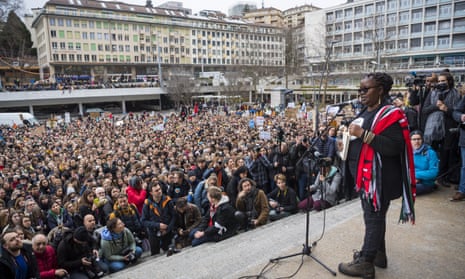The organisation that runs the annual Davos event attended by some of the world’s richest people has said greater social mobility would help narrow the gap between rich and poor and boost global growth by almost 5% in the next decade.
A report from the World Economic Forum found that only a handful of 82 countries surveyed had put in place policies that would foster social mobility but that a concerted effort to increase opportunities for people to achieve their full potential would have a marked impact on economic performance.
The WEF report found that the top five countries for social mobility were all Scandinavian, with only the US and Italy having a weaker performance than Britain among the G7 industrialised nations. The UK scored especially poorly for education and fair wage distribution.
Launched to mark the start of the annual meeting of the WEF in Davos, the report was published amid globally organised protests at rising inequality. Njoki Njehu, the pan-Africa coordinator for the Fight Inequality Alliance, said it was time for the billionaire class to be abolished.
The WEF said the world’s biggest economies – the US, China, Japan, Germany and India – had the most to gain from increasing social mobility, adding that the four priorities were fair wages, social protection, lifelong learning and better working conditions
“The social and economic consequences of inequality are profound and far-reaching: a growing sense of unfairness, precarity, perceived loss of identity and dignity, weakening social fabric, eroding trust in institutions, disenchantment with political processes and an erosion of the social contract, said Klaus Schwab, the founder and executive chairman of the WEF.
“The response by business and government must include a concerted effort to create new pathways to socioeconomic mobility, ensuring everyone has fair opportunities for success.”
In recent decades, the rich have been taking a bigger share of the proceeds of growth and the WEF report said inequality had become entrenched. It said the trend was likely to worsen in an era of technological change and as efforts towards a green economic transition were stepped up.
The report said the economic return from lifting social mobility across the board was “considerable”: if economies were able to improve their social mobility score by 10 points, GDP would increase by 4.4% by 2030 on top of the societal benefits such investments would bring.
Greater social mobility would require a new set of public investments but also needed shifts in business practice, the WEF said.
